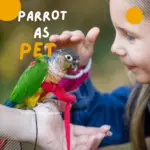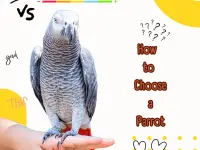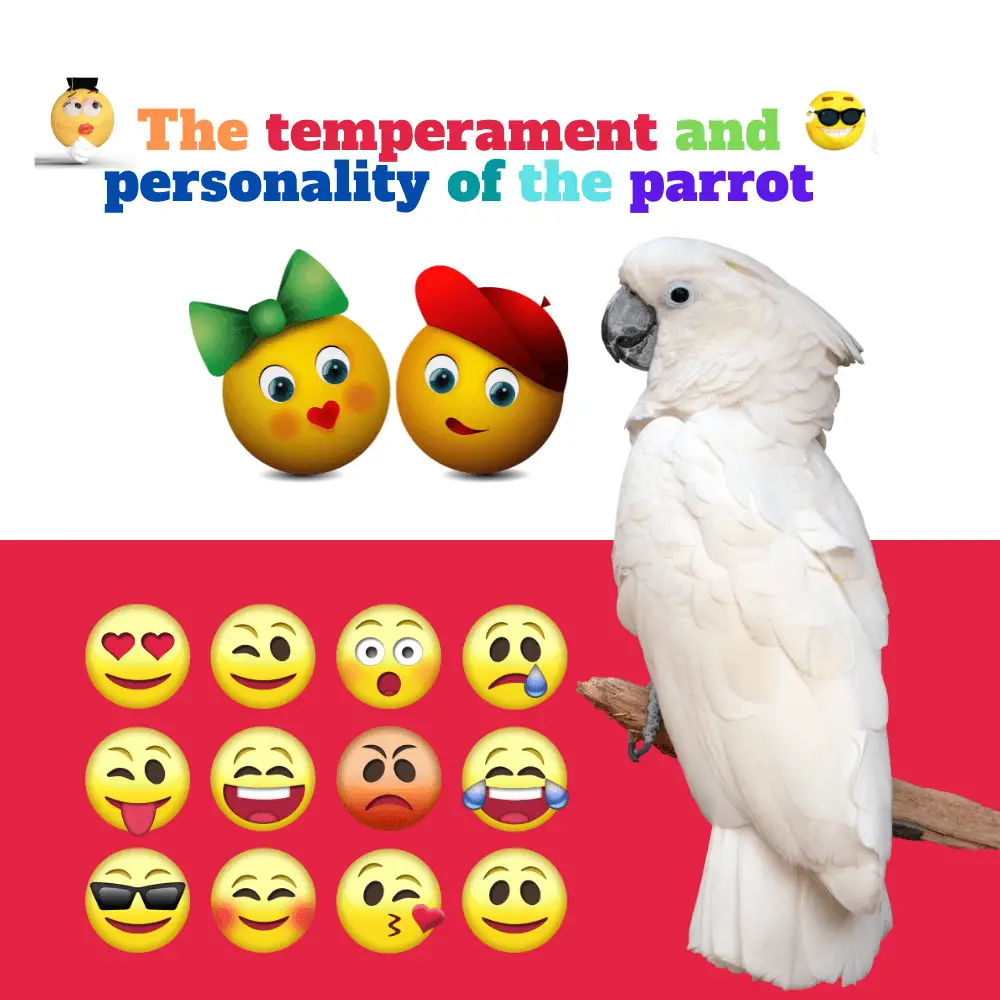
Parrot Personality: The characteristics of parrots, including those of the same species, do not come directly from the same mold and are far from identical.
Despite the fact that they share many similar characteristics with other individuals of their species or family, our parrots, by their temperament, are of unique complexion and we will have to learn to personalize our interactions with them according to their individual personalities.
Some parrots will be more rebellious than others. Some will be more expressive and outgoing while others will be more reserved in nature.
Some will be very active, spontaneous and athletic, others more moderate, thoughtful and wise. Some will like the company, and the new faces and will love to chatter in front of a conquered audience, while others will prefer to be surrounded only by their immediate social group and familiar faces. Some will like changes and upheavals, while others will be more “home-grown” and prefer a peaceful and routine life.
Parrot Temperament
The temperament is the set of innate characteristics of the bird which are fixed very early in its development. The temperament is in a way the basis on which the unique personality of our parrot will be built.
Temperament conditions the level of adaptability, activity, and sensitivity of the parrot to its environment. Temperament is the way the bird interacts with the world and it is particularly distinguished into two groups: the easy temperament and the lively temperament.
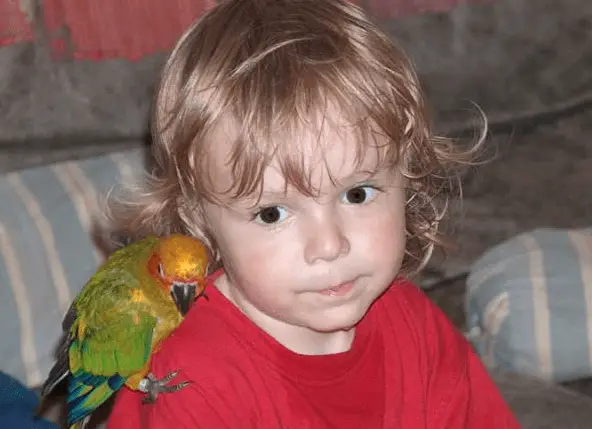
Parrot Personality
An easy-going temperament will generally develop a good-natured personality. He is less irritable, pays more attention to his environment and the consequences of his actions, he is curious but moderate. It is an easier bird to live with and, let’s say… more attentive to what it does.
An animated temperament forms a personality that is said to be active. He is more irritable, less patient, it is difficult to hold his attention, he reacts quickly to his environment without taking too much notice of the consequences related to his behavior.
A bird of lively temperament receives, as a rule, much less positive attention from its human, because it is often difficult for the latter to recognize or interpret in its behavior, the needs of the parrot. This bird is often reprimanded ( without knowing why ) and as a result, develops a lot of anxiety.
It is important for the human educator to recognize the temperament of his bird in order to adjust and adapt his socialization methods according to the latter. Lively temperaments often need more human help or attention in order to “cool” their temper in order to build a more balanced personality.
Often, it is difficult to determine the temperament of the very young bird when adopting; sometimes we have no choice but to refer to the generalities of the species when it comes time to choose the parrot that best suits our expectations and our lifestyle. But again, we must not lose sight of the fact that these are only generalities …
The personality of the bird will develop naturally according to the innate temperament of the individual, his experiences and the social framework in which he will evolve and the assets drawn from his environment. This is socialization… your part.
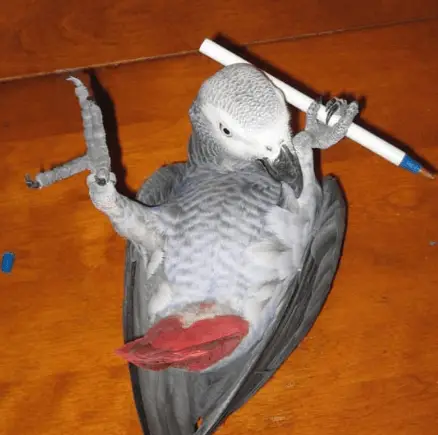
Parrot Personality
Are parrots friendly
It would be a big mistake to believe that all parrots “educate” themselves the same way. I have already met African grays that are completely boobies in society and I have also known cockatoos with an almost sickly shyness, which however seems very contrary to the general temperaments of these two species.
So there cannot be a single method of “education” with regard to such different personalities. In addition to the genetics of the species, we will need to learn to deal with the unique temperament and personality of the bird.
It is important, as a guide-educator, to understand the intrinsic temperament of our parrot in order to be able to appropriately adjust our methods of socialization.
If the parrot is of a fearful nature, it will be necessary to introduce the rules of conduct or the novelties slowly and while giving him time to get used to it, to gain confidence.
It is important not to force him, his degree of adaptability is less and he needs time to familiarize himself with a new situation. It’s not a behavior issue, it’s a temperament issue.
Remember that his personality will develop according to the responses he will have obtained from you in situations that seem more complex or “insecure” to him.
On the other hand, if your bird is active, rebellious, and self-confident, it is obvious that the approach will be quite different.
A parrot with an accommodating temperament can readily accept any new rule or rule without understanding all the ins and outs, while another, of a rather fearful type, will seem rebellious to accept any rule whatsoever if it is not. not quite clear, perfectly defined and above all, tailor-made for him.
The bird’s emotional threshold will depend entirely on its temperament and socialization. The richer and more stimulating the environment, the higher the bird’s emotional threshold will be.
Are parrots a good pet
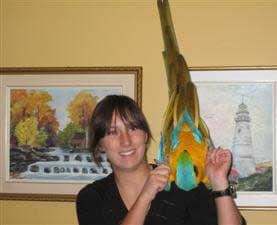
Parrots who have benefited from excellent socialization, who have had several enriching experiences: exposure to various situations or environments, even unpleasant ones, birds who have met various people, other than the immediate family, and who have even been manipulated by these strangers,
those who have been introduced to different foods and objects, including toys, at an early age, will develop a personality that will exhibit more balanced emotional responses at maturity. These parrots will therefore be much more resistant to stress.
Sensory deprivation is too often created by humans who try to overprotect their little parrot by avoiding any form of experience or adventure, for fear that they will get hurt or suffer some trauma, and who , therefore, denies him any social contact other than immediate family.
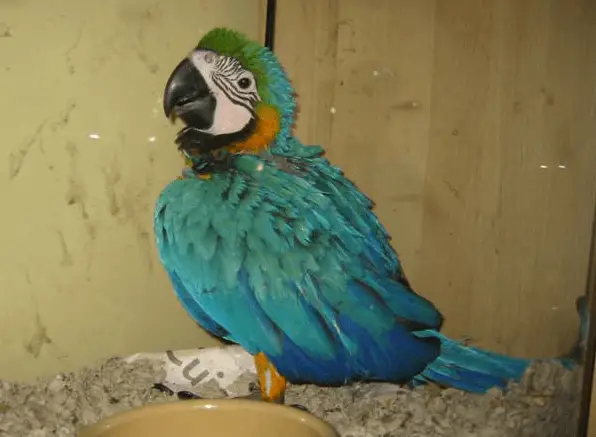
Parrot Personality
Of course, the reverse is just as disastrous; I am talking about a situation where the young parrot remains ignored or neglected during this very delicate phase which is the period of first socialization.
This deprivation will create a very low emotional threshold in the young bird and it is when this threshold is exceeded that the bird reacts with reactions of fear and anxiety, even going as far as aggression.
A bird with a low emotional threshold will reject any form of exploration and will become attached, often excessively to the known elements of its environment, which is more than conducive to the formation of habits and rituals…. when real behavior problems arise!
Temperament is an innate component in our parrot, it is the basis on which his personality will develop. On the other hand, it is with our mediation and the quality of the environment that we will provide him that he will forge a balanced personality. It is our duty to provide him with a stimulating environment and tailor-made socialization, just for him, according to his temperament.
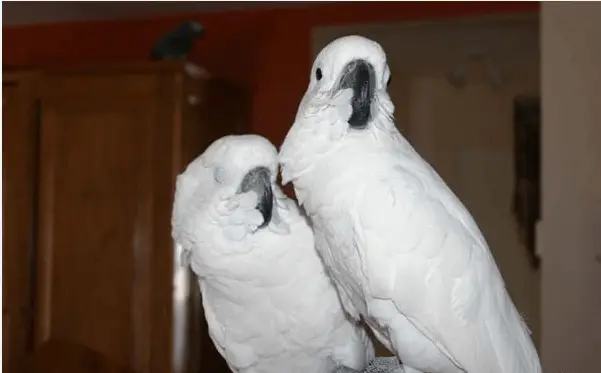
Parrot Personality
Parrot personality type
Very sociable and tamable, parrots are known for their talents as imitators, capable of speaking almost distinctly, laughing or crying, imitating certain animals, or even making gestures.
Eclectus parrot personality
The Eclectus is a very friendly and intelligent bird species described as gentle, quiet, and caring. Eclectus parrots are also affectionate.
Most thrive best when socializing is part of their daily routine. They treasure the time they spend interacting with their family. They are also sensitive and can quickly become stressed if they feel neglected. He appreciates the comings and goings while being part of it.
Around 18 months, the birds begin to reach sexual maturity. This is sometimes accompanied by a certain aggressiveness or the instinct to “feed” everything that is nearby. You may notice nasty biting behavior.
This period is called the bluff, and it is better to ignore it and turn to distraction techniques instead of reinforcing it. Over time, they go through this phase and learn what is acceptable.
While both males and females of the species make lovely pets, many owners claim that the males tend to be a bit more trained and pleasant. On the other hand, females are less dependent on their masters and tend to handle stress better.
Females can also be more bossy and aggressive than males, especially during breeding. Even in captivity, a female’s nesting instinct remains strong. You can find it trying to nest in secluded spots in your home.
Senegal parrot personality
They are generally very friendly when well socialized. A relatively large cage is necessary because they are real clowns, specialists in acrobatics of all kinds. Senegal parrots are loyal, faithful, and able to bond very quickly with a human.
Amazon parrot personality
The Amazons have a behavior that is most often reliable and above all readable. Any observer can reasonably predict and know what to expect with their bird, which is a huge quality.
They are generally active and playful, able to play alone with any piece of wood for hours. Autonomous and endowed with great self-confidence, these birds are not very prone to behaviors related to fear or pecking, for example.
Amazons are generally extraordinarily intelligent and require a lot of attention and time to avoid excesses (excessive shouting, territoriality, aggressiveness).
Training is more essential than ever, to deal with these potential problems. It is often said that having an amazon as a companion is like having to raise a 2-year-old child with an adult temperament!
Meyers parrot personality
Meyer’s parrot, or Poicephalus meyeri, is a great pet. This little bird with a green belly and a hooded gray coat are very amusing to observe. He is rather calm and not very noisy, playful, and affectionate.
Caique parrot personality
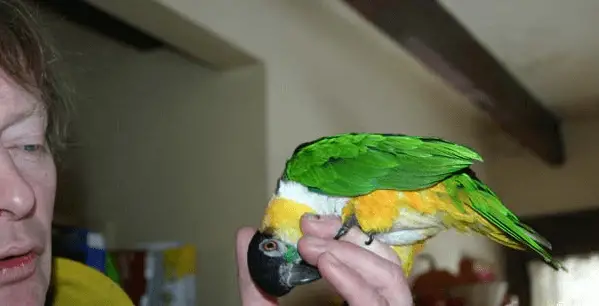
Caiques are known for the strong bonds they can form with humans. They love attention. They can be very affectionate and enjoy time spent playing with a human companion or just sitting with them.
If you’re looking for a new best friend, this might be the species for you. They love to show off and it’s not for nothing that they are called “dancing parrots”. They learn fast, are good at learning fun tricks, and have great personalities.
Caiques are playful and comical little birds that love activity and discovery. Always on the move, it is one of the most energetic parrots and quite curious, they are mischievous. These birds can also become grumpy at times and may nip or at the very least find ways to use their beak when interacting with people.
As a pet, caiques generally do well alone or in pairs, but be careful not to cage a caique with another species. They can become aggressive and inflict surprisingly hard bites.
Pionus parrot personality
the pionus is a bird happy to live and who shows it, he shows a great joy in living permanently. They like human company and follow their favorite human everywhere, limiting the pot of glue.
However, they have a strong personality and although not resentful, they can be difficult at times, like any parrot. Many people compare Jardine’s Parrot to the African Amazon because family life suits it very well.
Cape parrot personality
Cape parrots are prized for their charming personalities. There’s a lot about this cute bird: They’re elusive, intriguing, and all-around sweet monsters.
If they want to be reinforced, play alone, talk, or have fun, they will do so with relative silence and a calm demeanor. Pair that with their good talking abilities and high intelligence and you have a great pet and friend.


